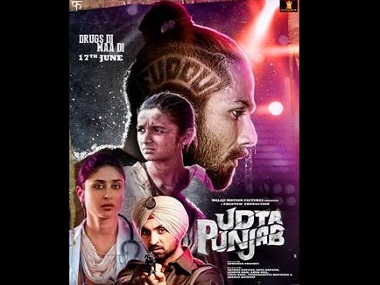After a protracted and very public battle with the Central Board of Film Certification in India, Udta Punjab has now found itself in trouble across the border. Pakistan’s CBFC has asked for 100 cuts before allowing the film (mainly pertaining to swear words) to be screened in theatres there. It is worth noting here that the CBFC in Pakistan is not merely a certification body like its Indian counterpart: The acronym stands for Central Board of Film Censors. “Censoring” then is an important part of this Islamabad-based agency’s function. It is currently headed by Mobashir Hasan. There are other watchdog bodies as well that take a call on films that can be screened in specific provinces — there is a Sindh Board of Film Certification, as well as one for Punjab. [caption id=“attachment_2849418” align=“alignleft” width=“380”]  Poster of ‘Udta Punjab’[/caption] When films from outside Pakistan are censored, it usually has to do with the depiction of the country, Islam, or allusions to state-sponsored terrorism. Indian films like Neerja, Phantom, Ek Tha Tiger have been banned in Pakistan for these reasons; so also have Hollywood movies like Zero Dark Thirty, GI Joe: Retaliation, Noah and The Da Vinci Code. At times, films deemed to be “morally objectionable” (The Dirty Picture, Delhi Belly) are also banned from being exhibited in Pakistani theatres. _Also read: Lollywood has a love-hate relationship with Bollywood. Here’s why._ The word “ban” was bandied about in the case of Udta Punjab as well; however, ultimately the Censor Board cleared it with 100 cuts. News reports have said that the film’s distributor is making the cuts in Dubai while readying for a release across the country over the weekend. However, it isn’t just with films from overseas that the Censor Board has had issues. Even with homegrown cinema, there is a conversation around censorship that is taking place in Pakistan. Like our own Pahlaj Nihalani-led CBFC and the Cinematograph Act of 1952 under which it is supposed to operate, the Censor Board in Pakistan too has had to deal with allegations of inconsistency in applying guidelines of the Motion Picture Ordinance, 1979 to the films in its purview. In April this year, Pakistan had its own version of the Udta Punjab row when the Urdu film Maalik was banned (at least one of the objections to the film was that a central character closely resembled the chief minister of one of the provinces). Its director Ashir Azeem tweeted the order banning Maalik, sparking national attention on the issue of censorship of cinema. Last year, Swaarangi — about the plight of drug addicts in Pakistan — faced a similar ban, but finally made it to theatres. Just like in India, such incidents have prompted debated around censorship in Pakistan too. The Indian producers of Udta Punjab have not made any statement so far about the cuts demanded of their film in Pakistan. Here, succour for the filmmakers came in the form of the Bombay High Court ruling that directed the CBFC to pass Udta Punjab with an ‘A’ certificate with just one cut. It seems unlikely that there will be a similar reprieve for their film in Pakistan. Update: This piece was originally published on 22 June 2016. On 25 June, news reports said that the makers of UdtaPunjab had decided not to release their film in Pakistan, after the censors there demanded 100 cuts before clearing it for public screening. Director Abhishek Chaubey told The Times of India that while the decision to not release the film across the border meant a loss of revenue, they did not see any sense in releasing Udta Punjab in such a mutilated form. “The film is intended to convey something and make a point,” he said, adding, “There is no scope to fight our case in Pakistan. So, we decided not to release the film there.”
The Censor Board in Pakistan has asked for 100 cuts in Udta Punjab. How is it different from India’s CBFC?
Advertisement
End of Article


)
)
)
)
)
)
)
)
)



